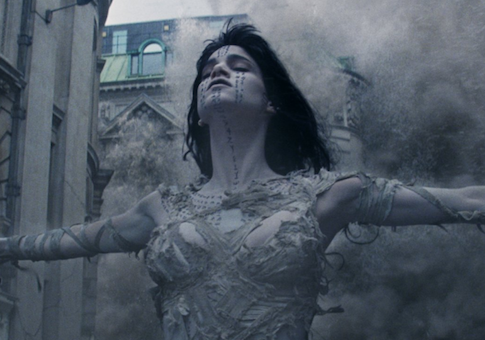This review discusses plot points from The Mummy, a movie you probably weren't planning on seeing, judging by domestic grosses thus far.
The Mummy isn't a movie so much as pre-packaged movie-like substance, an unholy combination of fading star power, intellectual property of questionable value, and studio desire to create a perpetual-motion movie machine in the form of a franchise that will appeal to people around the world for decades to come.
Tom Cruise stars as … well, Tom Cruise, I guess. He's a recon officer (and antiquities thief) in some branch or another of the United States military who uncovers a tomb containing a cursed Egyptian princess. He unleashes the princess, she unleashes hell, and he must defeat her before she is able to sacrifice him to Set, the Egyptian god of death. They would rule forever, darkening the skies, dogs and cats living together, etc.
I could talk about Cruise's performance, which is blank but fine. I could talk about the dullness of the CGI-enhanced scenes of death and destruction, which are bland and predictable but well done in that sort of soulless, computerized way. I could talk about Sofia Boutella's sultry and savage Ahmanet, who feels sadly underused, given that she's the titular monster. I could say that you should skip it because it's worse than incompetent: It's soulless.
None of that really matters, though. No one—certainly no one at Universal—cares about the art-adjacent qualities of this film. The only things that actually matter, the whole reason this movie even exists, are the scenes with Russell Crowe, who plays Dr. Jekyll (and Mr. Hyde) and runs a secretive organization known as Prodigium dedicated to defeating the occult.
Prodigium is the hub around which Universal's "Dark Universe" "shared cinematic universe" will revolve, "entertaining audiences" over a series of movies that will link The Mummy, Frankenstein, The Invisible Man, Dracula, and maybe a few other spare parts. There are little teases of future installments throughout The Mummy, especially in a scene in which Cruise walks through a sort of storage room where he sees, for instance, a skull with fangs and a claw that looks like it might belong to a creature from a notably dark lagoon. So many mysteries to unravel! So many stories to be told!
And so much money to be made! At least, in theory. Universal, like every other movie studio, looks at the success of Disney's Marvel Cinematic Universe and Warner Brothers' DC Expanded Universe with the greenest of eyes. Franchises are cool and all, but kind of passé. You know what's really cool? Franchises of franchises, franchises that can spin off sequels and crossovers and spinoffs for years, for decades.
As I said: a perpetual-motion movie machine.
Unlike Marvel and WB, Universal is banking on star power to sell its cinematic universe: Cruise, of course, will step into the role of The Mummy following the events of last weekend's movie (spoiler: he becomes The Mummy by the end of the film), while Johnny Depp will play The Invisible Man and Javier Bardem will play Frankenstein in a reboot of The Bride of Frankenstein. Whereas the Marvel and DC films are anchored by intellectual property to make money—tightly controlled, unusable by other studios—the Dark Universe movies are anchored by movie stars, theoretically able to put butts in seats around the world.
It's not a terrible idea. Foreign audiences are more important than ever and foreign audiences are more susceptible to the charms of a movie star's dreamy eyes than those of us in America. Just look at Bardem's and Depp's Pirates of the Caribbean: Dead Men Tell No Tales. A disappointment domestically (it has yet to crack $150 million in the United States), the film has still earned over $600 million worldwide. It may not earn back its $230 million budget (a figure that does not include ad buys), but it'll be close. The world market is responsible for any number of cinematic train wrecks—your Transformers, your Fast and Furiouses, your Warcrafts—but even overseas audiences are wising up. We'll see how The Mummy holds—at $175 million worldwide it's not a disaster, but it's certainly not a smash and probably won't crack $100 million at home.
But The Mummy's (likely modest, if not disastrous) haul is a bonanza compared to some of the more spectacular flops Hollywood has endured this year in its chase for franchise glory. Alien: Covenant has been a calamity, grossing just $181 million worldwide. Baywatch was relatively cheap to make but will still likely take a loss, having yet to crack nine figures. Ghost in the Shell? Just $40 million at home, fewer than $170 million total. And, of course, you have the biggest train wreck of them all: King Arthur: Legend of the Sword, which has grossed less than $140 million worldwide on a budget (not including advertising costs) of $175 million.
A few years back, Steven Spielberg suggested the film industry was only a couple of bad years—specifically, a few failed franchises in a row—from changing forever. I wonder if we're living through the first stages of that collapse right now, and I'm curious to see what comes next.
